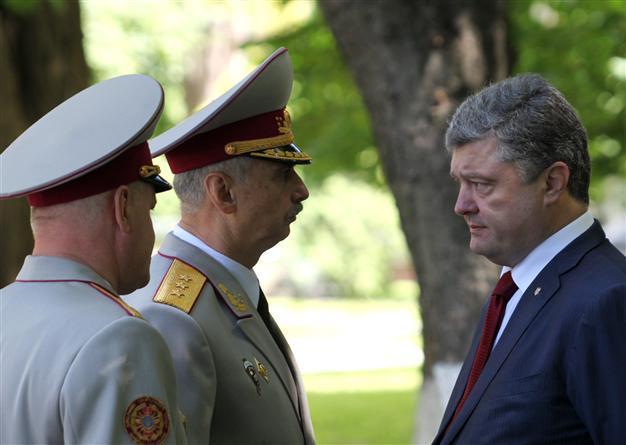Ukraine peace plan to call for 10-km buffer zone on Russia border
KYIV - Reuters

This handout picture taken and released by Ukraine's Presidential press-service on June 18, 2014 shows Ukrainian President Petro Poroshenko (R) speaking with Defense minister Mykhailo Koval during celebrations marking the release of students at the National University of Defense of Ukraine in Kiev. AFP Photo
President Petro Poroshenko will call for the creation of a 10-km buffer zone on the border with Russia under a 14-point plan to bring peace to east Ukraine, according to an unofficial copy published by media on Friday.
Ukraine says fighters from Russia and supplies of guns and other military equipment have been coming into the country to support pro-Russian separatists, and tightening control of the 1,900-km (1,190-mile) border is Ukraine's main security headache.
Details of the proposal to create a 10-km buffer zone, contained in a photographed copy of the 14-point plan and carried in Ukrainian media, were not spelled out.
It was not clear if the whole of the proposed demilitarised no-man's land would be on Ukraine's side of the border or part of it on the Russian side. It was also not clear what the status of people living in border areas would be.
Acting Defence Minister Mykhailo Koval told parliament on Friday that government forces were now back in control of the border and there was now no possibility of military equipment being ferried in to the rebels from Russia.
Poroshenko, installed in office on June 7, is under pressure to secure support from Russia, as well as his backers in the West, for a plan to end the rebellions in the Russian-speaking east and stabilise the country after seven months of upheaval.
He is expected to unveil the plan publicly on Friday despite a second day of heavy fighting in the east in which government forces say they have killed 300 rebels with the loss of 7 servicemen on the Ukrainian side.
Relations with Russia have deteriorated sharply since the ousting of the Moscow-leaning Viktor Yanukovich in February, Russia's subsequent annexation of Crimea and the outbreak of separatism in the east which Kiev says was instigated by Moscow.
In a telephone conversation on Thursday with Russian President Vladimir Putin, Poroshenko outlined the plan and asked the Kremlin leader to support it, according to his web site. His foreign minister will put it to the European Union on Monday.
The plan, according to the unofficial version, calls for early parliamentary elections to be held nationally as well as local elections in the regions.
Other parts of the plan would offer freedom from prosecution for separatists who put down their arms and had not committed "serious crimes" and require all hostages to be freed.
A corridor would be provided for "Russian and Ukrainian mercenaries" to leave the country safely and the clearing of all buildings held by rebel forces.
Addressing itself to grievances of people living in the east, it offered to amend the constitution that would allow for a "decentralisation" of powers to allow them a greater say in their affairs and guaranteed full Russian-language rights.
Poroshenko has said the peace plan, once accepted, will come into effect as soon as he orders Ukrainian forces to cease fire.
